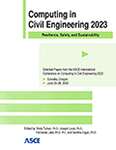Improving Health Monitoring of Construction Workers Using Physiological Data-Driven Techniques: An Ensemble Learning-Based Framework to Address Distributional Shifts
Publication: Computing in Civil Engineering 2023
ABSTRACT
While researchers have used various off-the-shelf physiological sensors and prevalent machine learning (ML) algorithms to objectively assess construction workers’ health status, there remain specific challenges for consistent and accurate health monitoring on the jobsite. The existing physiological-based data-driven frameworks for predicting workers’ health status in the field are not robust to the distribution shift of physiological signals and face challenges in stability, reliability, and accuracy. To overcome these issues, this paper proposes using an ensemble learning technique implemented on a support vector machine (SVM) with the Adaptive Boosting (AdaBoost) algorithm to develop a resilient predictive performance of the data-driven framework. To examine the performance of the framework, physiological signals were collected from 10 subjects performing material handling tasks with varying levels of physical fatigue. The proposed framework predicted the physical fatigue level with over 88% accuracy, better than single machine learning classifiers. This study has significant implications for improving the accuracy and stability of physiological-sensing-based health monitoring.
Get full access to this article
View all available purchase options and get full access to this chapter.
REFERENCES
Aryal, A., A. Ghahramani, and B. Becerik-Gerber. 2017. “Monitoring fatigue in construction workers using physiological measurements.” Autom Constr, 82: 154–165. Elsevier B.V. https://doi.org/10.1016/j.autcon.2017.03.003.
Awolusi, I., E. Marks, and M. Hallowell. 2018. “Wearable technology for personalized construction safety monitoring and trending: Review of applicable devices.” Autom Constr, 85: 96–106. Elsevier B.V. https://doi.org/10.1016/j.autcon.2017.10.010.
Bureau of Labour. 2018. Employer-Reported Workplace Injuries and Illnesses.
Cohen, S., and N. Hamrick. 2003. “Stable individual differences in physiological response to stressors: implications for stress-elicited changes in immune related health.” Brain Behav Immun, 17 (6): 407–414. https://doi.org/10.1016/S0889-1591(03)00110-7.
Habibi, P., H. Dehghan, S. Rezaei, and K. Maghsoudi. 2014. Physiological and perceptual heat strain responses in Iranian Veiled women under laboratory thermal Conditions. Iranian Journal of Health, Safety & Environment.
Hwang, S., and S. H. Lee. 2017. “Wristband-type wearable health devices to measure construction workers’ physical demands.” Autom Constr, 83: 330–340. Elsevier B.V. https://doi.org/10.1016/j.autcon.2017.06.003.
Jebelli, H., B. Choi, and S. Lee. 2019. “Application of Wearable Biosensors to Construction Sites. II: Assessing Workers’ Physical Demand.” J Constr Eng Manag, 145 (12). https://doi.org/10.1061/(ASCE)CO.1943-7862.0001710.
Jebelli, H., S. Hwang, and S. Lee. 2018. “EEG-based workers’ stress recognition at construction sites.” Autom Constr, 93: 315–324. https://doi.org/10.1016/j.autcon.2018.05.027.
Li, R., L. Zhou, S. Zhang, H. Liu, X. Huang, and Z. Sun. 2019. “Software Defect Prediction Based on Ensemble Learning.” ACM International Conference Proceeding Series, 6: 1–6. Association for Computing Machinery. https://doi.org/10.1145/3352411.3352412.
Liu, Y., M. Habibnezhad, and H. Jebelli. 2021. “Brain-computer interface for hands-free teleoperation of construction robots.” Autom Constr, 123: 103523. Elsevier. https://doi.org/10.1016/J.AUTCON.2020.103523.
Matthews, K. A., S. B. Manuck, and P. G. Saab. 1986. “Cardiovascular Responses of Adolescents During a Naturally Occurring Stressor and Their Behavioral and Psychophysiological Predictors.” Psychophysiology, 23 (2): 198–209. https://doi.org/10.1111/j.1469-8986.1986.tb00618.x.
Rabeiy, R. E. 2019. “Evaluation of indoor heat stress on workers of bakeries at Assiut City, Egypt.” International Journal of Environmental Science and Technology, 16 (6): 2637–2642. Center for Environmental and Energy Research and Studies. https://doi.org/10.1007/s13762-018-1839-z.
Reddy, J. M., and C. Hota. 2013. “P2P traffic classification using ensemble learning.” ACM International Conference Proceeding Series. Association for Computing Machinery. https://doi.org/10.1145/2528228.2528243.
Sadat-Mohammadi, M., S. Shakerian, Y. Liu, S. Asadi, and H. Jebelli. 2021. “Non-invasive physical demand assessment using wearable respiration sensor and random forest classifier.” Journal of Building Engineering, 44: 103279. Elsevier BV. https://doi.org/10.1016/J.JOBE.2021.103279.
Shakerian, S., M. Habibnezhad, A. Ojha, G. Lee, Y. Liu, H. Jebelli, and S. H. Lee. 2021. “Assessing occupational risk of heat stress at construction: A worker-centric wearable sensor-based approach.” Saf Sci, 142: 105395. Elsevier. https://doi.org/10.1016/J.SSCI.2021.105395.
Tixier, A. J.-P., M. R. Hallowell, B. Rajagopalan, and D. Bowman. 2016. “Application of machine learning to construction injury prediction.” Autom Constr, 69: 102–114. https://doi.org/10.1016/j.autcon.2016.05.016.
Wang, C., L. Hu, M. Guo, X. Liu, and Q. Zou. 2015. “imDC: an ensemble learning method for imbalanced classification with miRNA data.” Genetics and Molecular Research, 14 (1): 123–133. https://doi.org/10.4238/2015.January.15.15.
Information & Authors
Information
Published In
History
Published online: Jan 25, 2024
ASCE Technical Topics:
- Algorithms
- Artificial intelligence and machine learning
- Business management
- Computer programming
- Computing in civil engineering
- Construction engineering
- Construction equipment
- Construction methods
- Employment
- Engineering fundamentals
- Equipment and machinery
- Fatigue (material)
- Labor
- Material mechanics
- Material properties
- Materials engineering
- Mathematics
- Occupational safety
- Personnel management
- Practice and Profession
- Probe instruments
- Public administration
- Public health and safety
- Safety
Authors
Metrics & Citations
Metrics
Citations
Download citation
If you have the appropriate software installed, you can download article citation data to the citation manager of your choice. Simply select your manager software from the list below and click Download.
